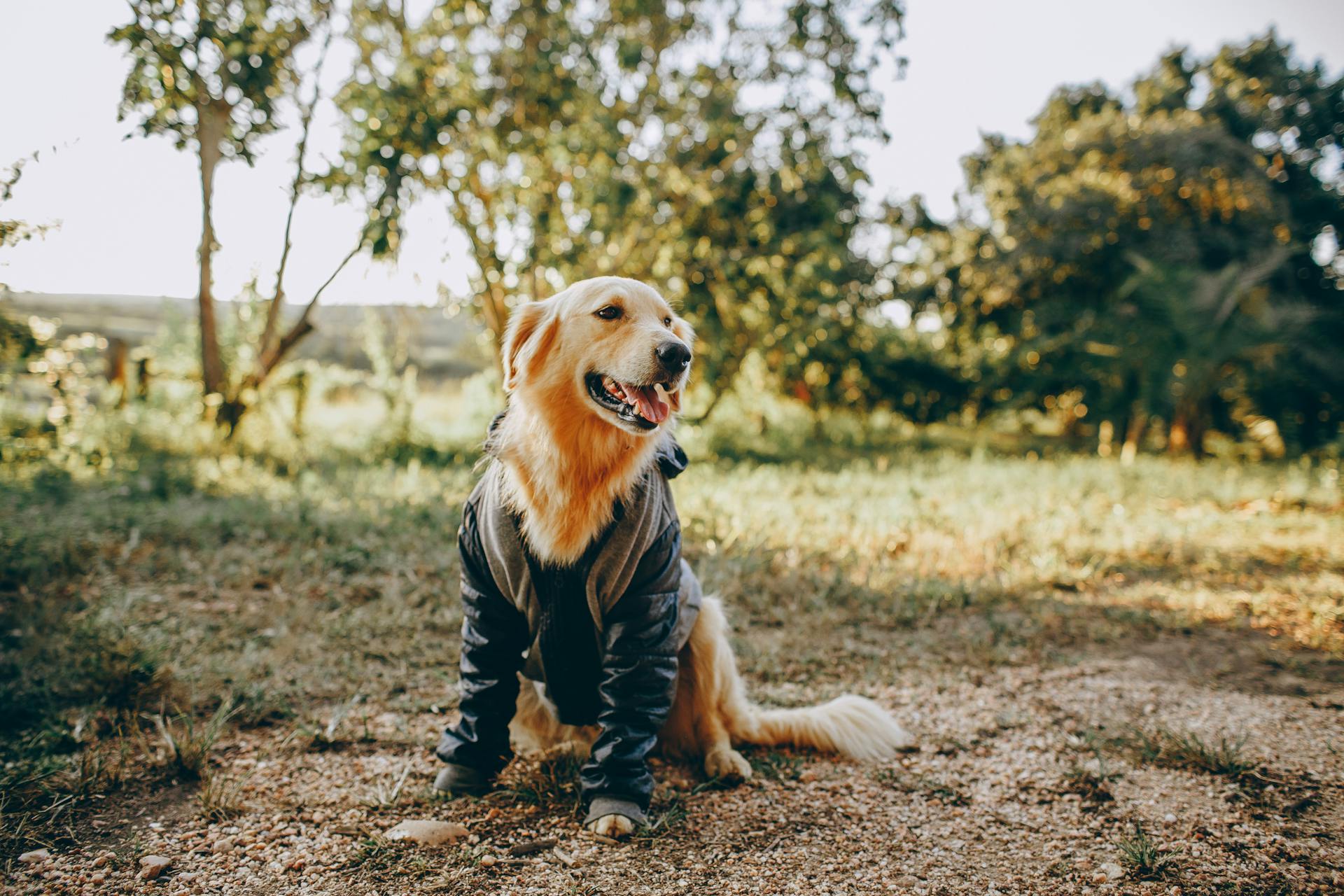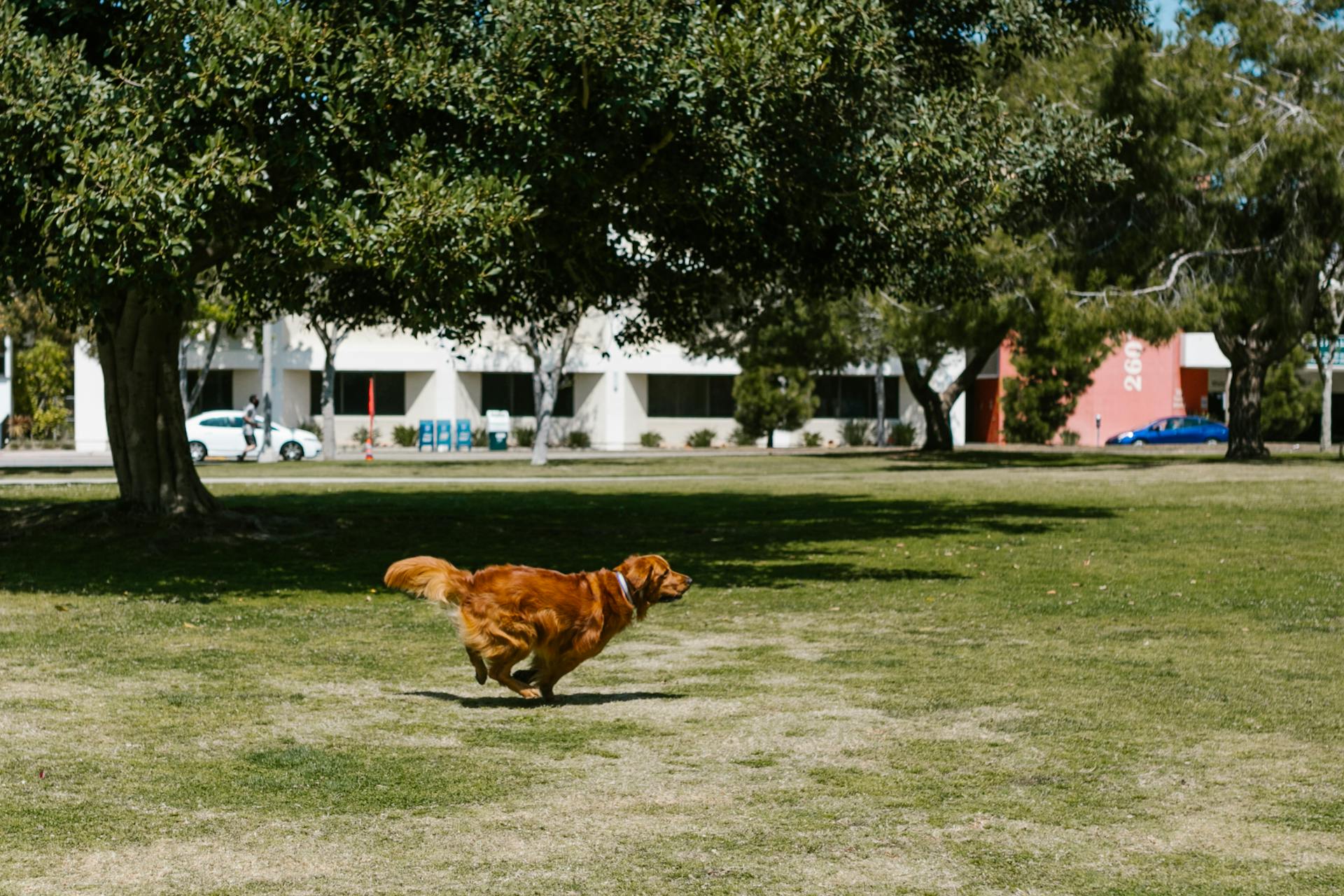
A Golden Retriever Lab Mix can live for around 10 to 12 years, which is a decent lifespan for a medium to large-sized breed.
Their energy levels are moderate to high, requiring daily exercise to stay happy and healthy.
Golden Retriever Lab Mixes are prone to health issues like hip dysplasia and obesity, so regular veterinary check-ups and a balanced diet are crucial.
With proper care, they can thrive and become loving family members.
Lifespan and Health
The lifespan of a Golden Retriever Labrador mix is around 10 to 12 years, although some may live up to 15 years or more with proper care.
This breed is prone to certain health issues, including hip dysplasia, elbow dysplasia, and progressive retinal atrophy, which can cause pain and discomfort. These conditions can be managed with regular checkups and a healthy lifestyle.
A Golden Retriever Labrador mix is equivalent to around 77 human years at 12 years old, due to the breed's rapid aging process.
Some potential health conditions to be aware of include cancer, obesity, and cataracts. Regular exercise, a balanced diet, and regular veterinary checkups can help prevent or manage these conditions.
Here are some common health issues that can affect Golden Retriever Labrador mixes:
- Hip dysplasia
- Elbow dysplasia
- Progressive retinal atrophy
- Cancer
- Obesity
- Cataracts
Average Lifespan
The average lifespan of a Golden Retriever is about 10 to 12 years.
In some cases, Golden Retrievers can live 15 years or longer, though this is rare. This may not seem like a long time to you, but it's actually a significant life span for a dog.
Dogs age faster than humans, and it's not just a matter of one dog year equaling 7 human years. The first year of a dog's life is equivalent to about 15 human years.
A dog that is 5 years old is equivalent to 36 human years. This is why it's essential to provide your dog with proper care and attention during their critical early years.
A Golden Retriever 12 years old would actually be around 77 years old in human years. This highlights the importance of making the most of the time you have with your furry friend.
See what others are reading: Average Lifespan Lab Mix
Health Issues
As a responsible dog owner, it's essential to be aware of the potential health issues that can affect your Goldador. Hip dysplasia is a common problem in both Golden Retrievers and Labradors, causing joint pain and limited mobility.
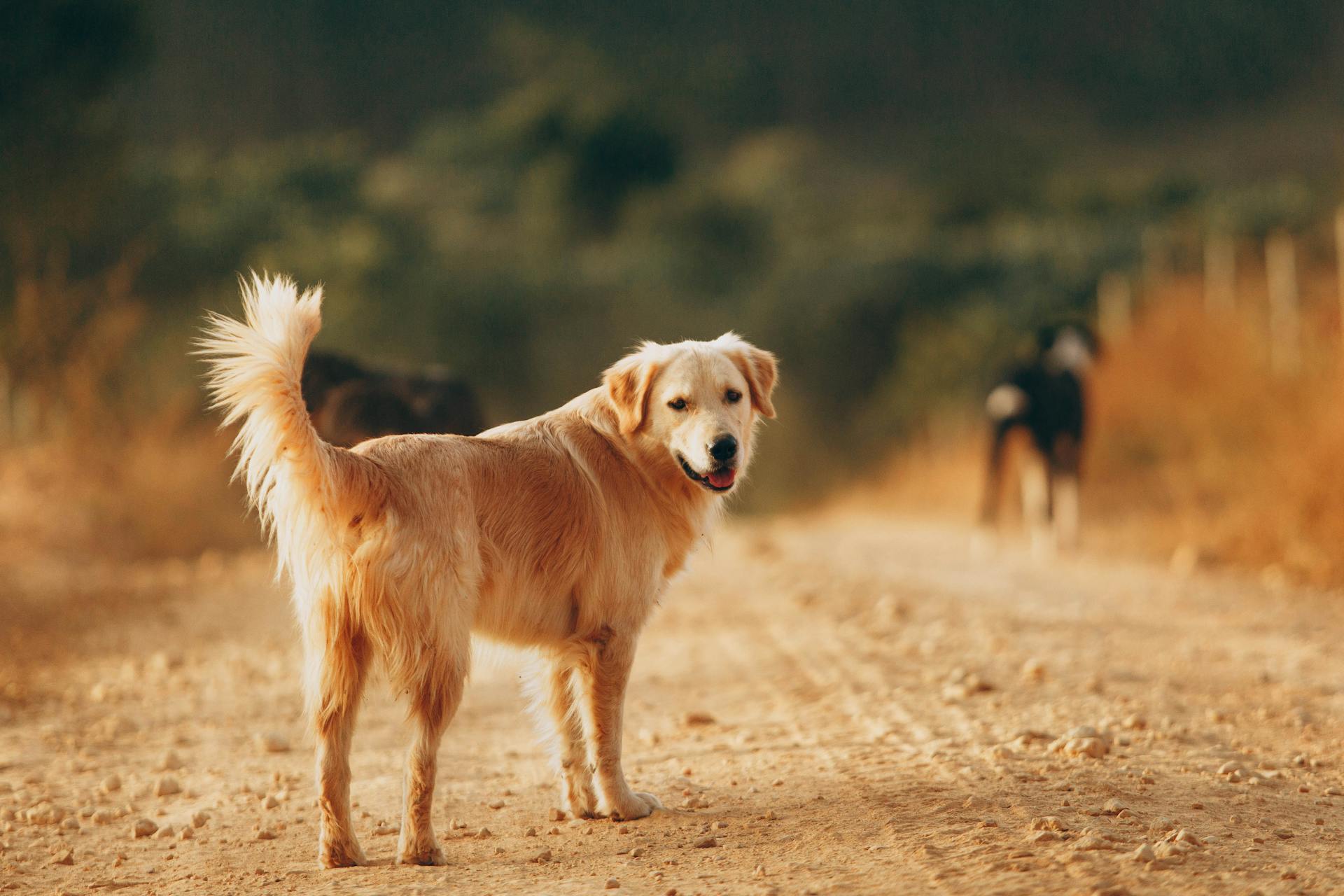
Goldadors are also prone to elbow dysplasia, a condition where the three bones in the elbow grow at different rates or a piece breaks off, leading to pain and stiffness.
Progressive retinal atrophy is a genetic condition that can cause vision loss if not diagnosed and treated early. Bloat is another serious issue that can be caused by eating quickly or drinking too much before exercising.
Cancer is a significant risk for Goldadors, with bone cancers, spleen cancer, and mast cell tumors being common types. Obesity is also a concern, as it can lead to a range of health problems.
Here are some common health issues that can affect Goldadors, along with their potential causes and symptoms:
Regular check-ups with the vet, a healthy diet, and regular exercise can help prevent or manage these health issues. By being aware of these potential problems, you can take steps to keep your Goldador happy and healthy for years to come.
Nutrition and Diet
A well-balanced diet is crucial for a Golden Retriever Lab mix's lifespan.
Dogs that eat commercial dog food live an average of 10.4 years, while those that eat only homemade food live an average of 13.1 years.
Feeding your Golden Retriever high-quality commercial dog food can increase their life expectancy.
Golden Retrievers are healthier when they eat a diet high in meat-based proteins.
Dogs can benefit from plants in their diet, but they are healthier when they eat high-quality dog food that contains meat-based protein as the main ingredient.
Adult Golden Retrievers should eat between 2 ½ to 3 cups of high-quality food per day.
A protein-rich diet consisting of 18–22% protein is essential for Golden Labrador Retrievers.
Their diet should be low in fats and higher in protein to prevent obesity.
Puppies require a higher percentage of protein (between 20% and 22%) during the first year.
It's best to speak to a veterinarian to determine your Golden Labrador Retriever's ideal diet.
A fresh viewpoint: How Long Does a Pekingese Dog Live
Environment and Care
Goldador dogs have a coat that's easy to care for, but they shed a great deal, so regular brushing is a must. Brush them every few days, with daily brushing during the heavier shedding seasons.
Their ears are pendulous, so they need to be cleaned a few times a month to prevent ear infections. Daily teeth brushing is also essential to prevent periodontal disease.
Goldadors are highly intelligent and eager to please, making them a breeze to train. Keep training treats on hand and be generous with praise and head pats to lead short, productive sessions.
Environment and Conditions
Living in a household where people smoke can have a negative impact on a dog's lifespan. Research suggests that dogs exposed to secondhand smoke are more likely to age prematurely.
Chronic stress in dogs can also lead to a shorter lifespan. This can be caused by the overall environment and how much time is spent playing with the dog.
Intriguing read: Golden Gate Lab Rescue Available Dogs

Dogs that receive less attention from their owners, especially as they get older, tend to live shorter lives. This highlights the importance of spending quality time with your dog.
Goldadors are social dogs that thrive on interaction with their human family members. They don't like to be left home alone for long periods of time without their humans.
Environment
Golden Labradors and Goldadors need space to run around, but they can adapt to apartment living as long as they get regular exercise.
They love to play fetch, chase other dogs, and swim, so a backyard or a park is ideal for them.
These dogs are social butterflies and love making friends with people and animals alike, so they can fit well into homes with cats or other dogs.
However, socializing your Goldador puppy with other animals early on is crucial to ensure peace among your pets.
They don't like to be left home alone for long periods of time, so they make great adventure buddies who'll gladly accompany you on hikes and splashing around at the local lake.
Their bones are still growing until they're around 18-20 months old, so it's essential to avoid high-intensity exercise like long jogs to prevent hurting their developing bodies.
A daily exercise routine is a must for Golden Labradors and Goldadors, with a healthy adult needing between one and two hours of exercise a day.
Care
The goldador's coat is relatively easy to care for, but they do shed a lot, so regular brushing is a must. You'll need to brush them every few days, with daily brushing during the heavier shedding seasons.
Their ears are prone to infections, so cleaning them a few times a month is essential. It's also crucial to brush their teeth daily to prevent periodontal disease.
Goldadors are highly intelligent and eager to please, making training a breeze. Positive reinforcement and plenty of praise and treats will help them learn quickly.
Here are some key care tips to keep in mind:
- Brush their coat every few days, with daily brushing during heavy shedding seasons
- Clean their ears a few times a month to prevent infections
- Brush their teeth daily to prevent periodontal disease
- Use positive reinforcement and plenty of praise and treats for training
Size and Characteristics
A Golden Retriever Lab Mix, also known as a Goldador, can inherit characteristics from either parent or both.
Their size is equivalent to that of a large dog breed, which means they age faster and have a shorter lifespan compared to smaller breeds.
Obesity can lower their lifespan, as it can lead to a larger size and weight, which can put additional strain on their body.
Like humans, a dog's body starts to work more slowly at a certain age until it eventually stops working altogether, which can be around 77 years old in human years for a 12-year-old Golden Retriever.
The characteristics of a Goldador can vary from one dog to another, and it's not a guarantee that they'll inherit exactly 50% of their characteristics from one parent and 50% from the other.
Their personality and appearance are a combination of their genetics, environment, and the quality, type, and amount of training and socialization they receive.
See what others are reading: Lab Shepherd Mix Size
Size
The size of a dog can have a significant impact on its lifespan. Large dogs like Golden Retrievers age faster than smaller breeds.
Golden Retrievers are considered large dogs, which means their lifespan is shorter compared to smaller breeds. Some smaller dog breeds can live up to 20 years.
Obesity plays a role in lowering a dog's lifespan, making them larger in weight and overall size. This can affect their lifespan and overall health.
A dog's body starts to work more slowly at a certain age, similar to humans. Since the average lifespan of humans ranges in the mid-70s, a dog that is 77 years old has actually lived quite a long life.
Take a look at this: Hemangiosarcoma in Golden Retrievers
What Are the Main Characteristics of a Mix?
A mix-breed dog's characteristics can be a unique combination of its parent breeds.
The characteristics of a mix, like a Labrador Golden Retriever mix, can be heavily weighted towards one parent more than the other, meaning it's not always a 50/50 split.
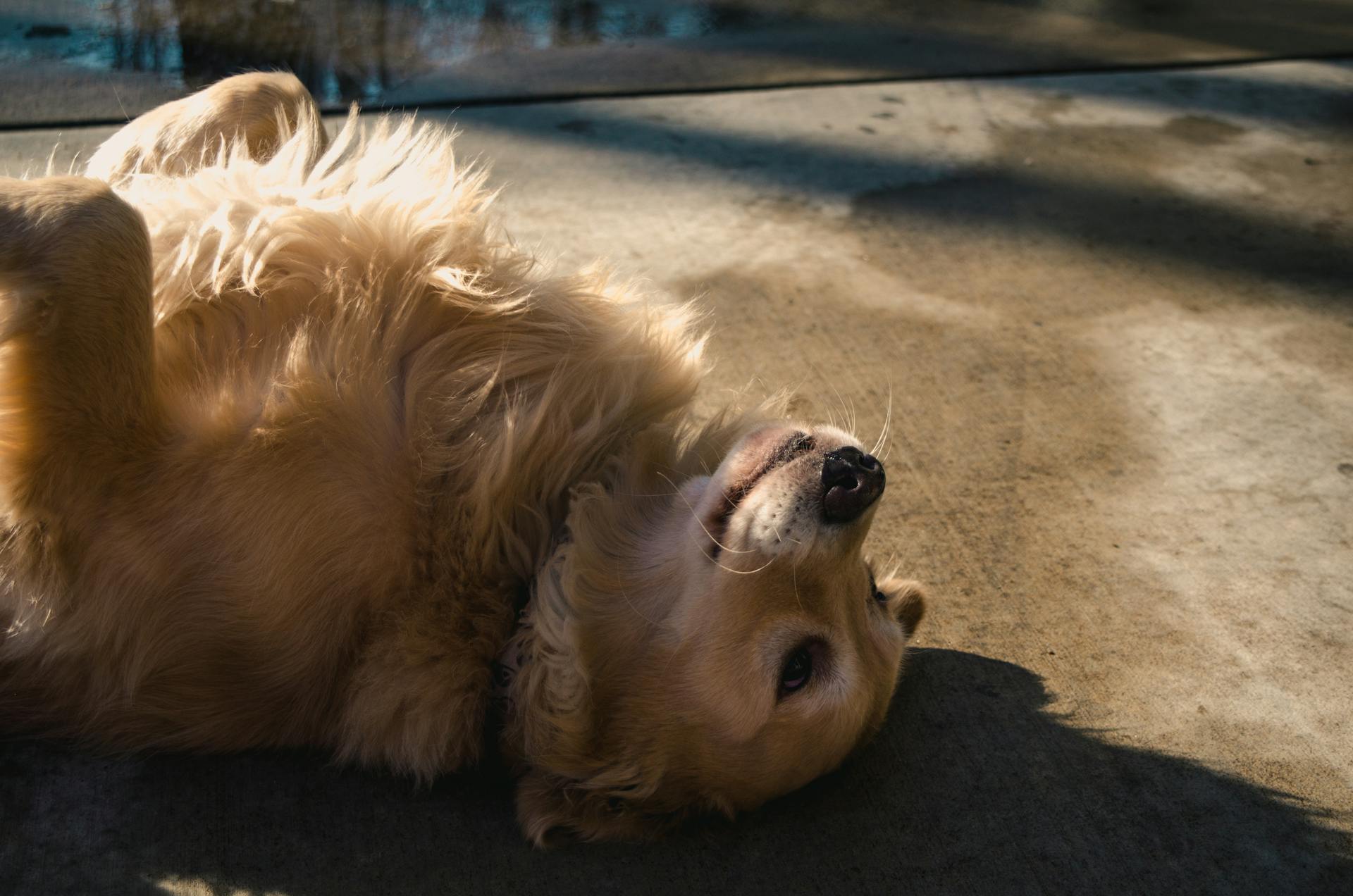
The environment and quality of training and socialization also play a role in shaping a mix-breed dog's personality and appearance.
Any mix-breed dog can inherit all, some, or none of the health issues its parent breeds have, making it difficult to predict its overall health.
The characteristics of a mix-breed dog are influenced by genetics, environment, and training, making each dog's personality and appearance unique.
Temperament and Training
The Golden Retriever Lab mix is known for being sweet and sociable, inheriting a loving and gentle nature from its parent breeds. They're generally easy-going and affectionate, welcoming everyone into their home.
Their high intelligence and trainability make them a great fit for jobs that assist humans. With positive reinforcement and small treats, training should be a breeze.
Goldadors tend to showcase the easygoing and affectionate attitude of the retriever, and they generally get along well with other dogs and household pets. With some training, they can also do well with other pets.
Both parent breeds were used for hunting, so this cross-breed is always going to be active. Providing at least 60 minutes of structured exercise per day is essential to keep their mind and body healthy and busy.
Early socialization and discipline are crucial for this breed, especially since they have herding and service dog parents. If they're bored, they may become destructive and bark.
Their high energy level means they're not suited for a sedentary lifestyle. They'll enjoy as much exercise and action as their owner can provide.
The Goldador puppy is energetic, easily trained, and wants to please, which can sometimes lead to unwanted presents. They'll form an early bond and lasting companionship with their owner, but they do require early training and socialization to control their excitement in public.
Life Stages
As a golden retriever lab mix owner, understanding the life stages of your furry friend is crucial for providing the best care. Labrador Retrievers, being a part of the mix, go through three main life stages: Puppyhood, Adulthood, and Senior Years.
Puppyhood is a critical stage where your golden retriever lab mix will grow rapidly and develop its temperament. This stage typically lasts from 0 to 1 year.
During Adulthood, your golden retriever lab mix will reach its full physical and mental development, typically between 1 to 7 years old.
Puppyhood
Puppyhood is a time of rapid growth and development for Labrador Retrievers, and it's essential to provide them with proper nutrition to meet their nutritional needs.
Puppies should be fed a high-quality diet that meets their nutritional requirements.
During this stage, they need plenty of opportunities to play and explore their environment.
Senior Years
As your dog enters their senior years, you may start to notice changes in their behavior and physical abilities. After age 8, Golden Retrievers are considered senior dogs, equivalent to 55 or older in human years.
Their metabolism will slow down, and they may gain weight, so it's essential to monitor their diet. At this age, they'll have less energy and may need more frequent vet check-ups to catch any potential issues early on.
Providing a comfortable environment is crucial for senior dogs, and adjusting their exercise routine can help maintain their physical and mental health. A healthy diet and regular vet check-ups are also vital to ensure they live a long and healthy life.
As your dog ages, they may become less active and have trouble with mobility, so it's essential to provide them with a supportive and comfortable living space.
Life Stages
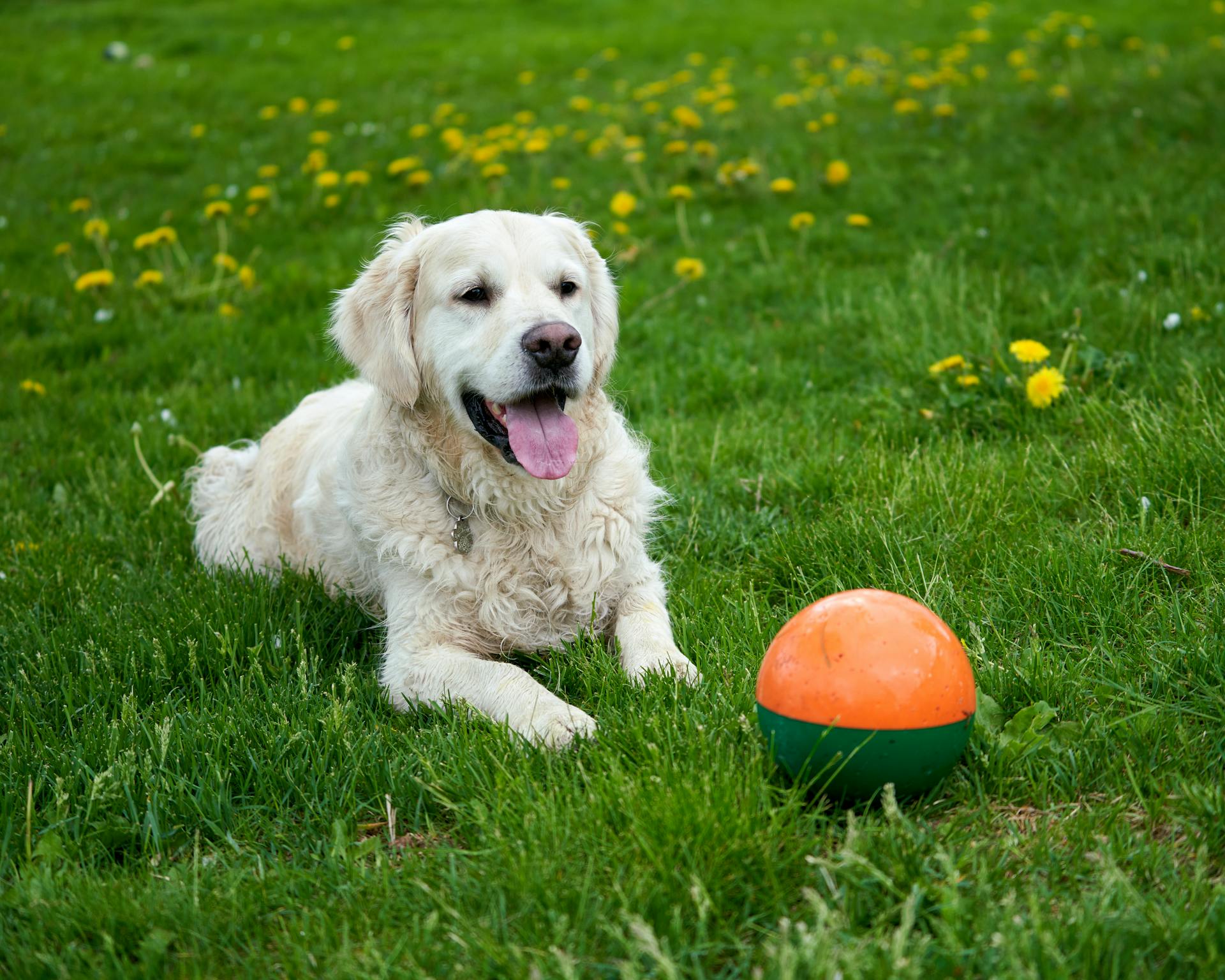
As a pet owner, understanding the life stages of your furry friend is crucial for providing the right care. Labrador Retrievers go through three main life stages: Puppyhood, Adulthood, and Senior Years.
Puppyhood is a critical stage, typically lasting from birth to one year. During this time, they need plenty of socialization and training to develop good habits.
Labrador Retrievers reach physical maturity by the time they're one year old, but their mental maturity takes a bit longer. It's essential to continue training and socialization beyond their first year.
As they enter Adulthood, typically between one to seven years old, Labrador Retrievers are at their physical peak. They need regular exercise and mental stimulation to keep them happy and healthy.
Senior Years start around seven years old, and it's essential to adjust their care accordingly. This may include more frequent veterinary check-ups, a balanced diet, and gentle exercise to maintain their quality of life.
Frequently Asked Questions
What is the life expectancy of a Golden Retriever vs Labrador?
Golden Retrievers typically live 10-13 years, while Labradors live 10-12 years, with Golden Retrievers having a slightly longer lifespan on average.
Sources
- https://www.dogster.com/dog-breeds/golden-retriever-lifespan-how-long-do-they-live
- https://www.dogster.com/dog-breeds/golden-labrador-retriever
- https://animalcorner.org/dog-breeds/golden-retriever-lab-mix/
- https://www.dailypaws.com/dogs-puppies/dog-breeds/goldador
- https://blog.tryfi.com/how-long-do-labs-live/
Featured Images: pexels.com
